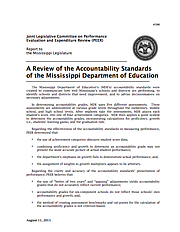Jackson Public Schools Superintendent Cedrick Gray plans to lift his district’s grade from a D to an A in three years, he says. Trip Burns/File Photo
How schools are graded is important. Grade them too easily, and failing districts and schools will make the cut despite miserable conditions or poor teaching and standards. Grade them too harshly, and several districts will continue to fail, despite attempts at improvements.
The state grades Mississippi public schools based on an A-F scale, according to its accountability standards. Mississippi began assigning A-to-F grades in 2012 and switched to a new underlying system of scoring in 2014. The new system is under fire in a recent PEER study that has called for changes. PEER is a bi-partisan legislative committee that reviews and investigates state agency programs.
The shifting of accountability scoring standards has not affected Jackson Public Schools' grade, a D, for the past two years.
Jackson Public Schools Chief of Staff Jason Sargent said he is unsure if PEER's suggested changes would help or hurt the district's grade. JPS' overall D grade is a combination of each school's individual performance as well as graduation rates, and growth in history, science, math and reading subject areas.
Sargent said despite receiving a D grade again, JPS has decreased its number of failing schools. In 2013, the district had 17 failing schools. Now only eight middle schools and elementary schools have an F grade.
The accountability system, however, might not be the best measure for a district's performance. Even before the PEER report came out, Jackson city and school officials at the JPS budget hearing criticized the accountability rating system and raised questions about its validity. The district's grade is not determined based solely on the number of failing schools, Sargent said.
"Depending on how it's calculated, this upcoming year we could still have eight failing schools and move our rating to a C," he said.
JPS Superintendent Cedrick Gray has publicized his strategic plan to get JPS to be an A district in three years, and Sargent said the focus is not only on the failing schools but on all schools to bring up individual school grades to As and Bs.
PEER's Concerns
The district's predicament is common—39 districts in the state received D grades in 2014—only one school district in the state got an F: Hinds County AHS District.
The PEER study said that the accountability standards should have more emphasis based on proficiency rather than growth or benchmark scores that districts have too much control over.
"If the purpose of the accountability standards is to improve student achievement and increase the level of accountability of schools and districts, then more emphasis should be placed on proficiency—how a student actually performs on the assessments," states the report by the Performance Evaluation and Expenditure Review Committee.
State Superintendent Carey Wright, though, fundamentally disagrees with the report's recommendations. She said PEER's recommendations would weaken the statistical validity of Mississippi's A-to-F grades for schools and that de-emphasizing student growth would penalize schools that are making strides in student performance.
"There's nothing arbitrary about our accountability model," Wright told reporters attending a meeting of the state Board of Education at its temporary office in Clinton.
A key element of that model takes students' test scores and assigns them to one of four performance groups—minimal, basic, proficient or advanced. The model then assigns points based on what share of a school's students are proficient and advanced.
PEER said such sorting is imprecise and could give equal credit to a school where students all scored in the proficient range and a school where all scored advanced. The committee recommended instead that the department publish scores as a share of possible points.
The report recommended a grade based solely on scores, and then a separate measure showing whether scores grew, fell or were flat. Without including growth, Wright warns that schools where poor students start behind but learn a lot would be "systematically disadvantaged" compared to schools with more affluent students.
On Friday, the Department of Education issued their 85-page response to the PEER study, rejecting the report's concerns, saying that the group used no empirical data or analytics to back up their report's claims.
The department's press release also issued on Friday said they use a task force made up of superintendents, administrators and legislators as well as an external review team to evaluate school districts.
PEER said the use of a committee to set score cutoffs is "subjective," allowing officials to make schools "look good." PEER also questioned whether Mississippi dropped its requirement for high-school seniors to pass four subject-area tests to graduate to manipulate graduation rates.
Because Mississippi's accountability system is written into state law, legislators could ultimately judge the report. Nicole Webb, a spokeswoman for Gov. Phil Bryant, said his office was reviewing the report, saying it appears to contain "valuable information."
2014 Mississippi School Districts Report Card
Most school districts in the state are in the received Bs, Cs and Ds, according to the Mississippi Department of Education accountability system.
# of Districts Receiving Each Grade:
A: 19
B: 43
C: 48
D: 39
F: 1
More like this story
- PEER Questions Grading System for Public Schools
- State Accountability Ratings Gloomy for Jackson Schools
- No 'Failing' Districts, but Two Jackson Middle Schools Get 'F' in State Scoring
- UPDATED: JPS Draws Expected 'F' in MDE District, School Grades Released Today
- JPS Board, Supe Under Fire Over Scores




Comments
Use the comment form below to begin a discussion about this content.